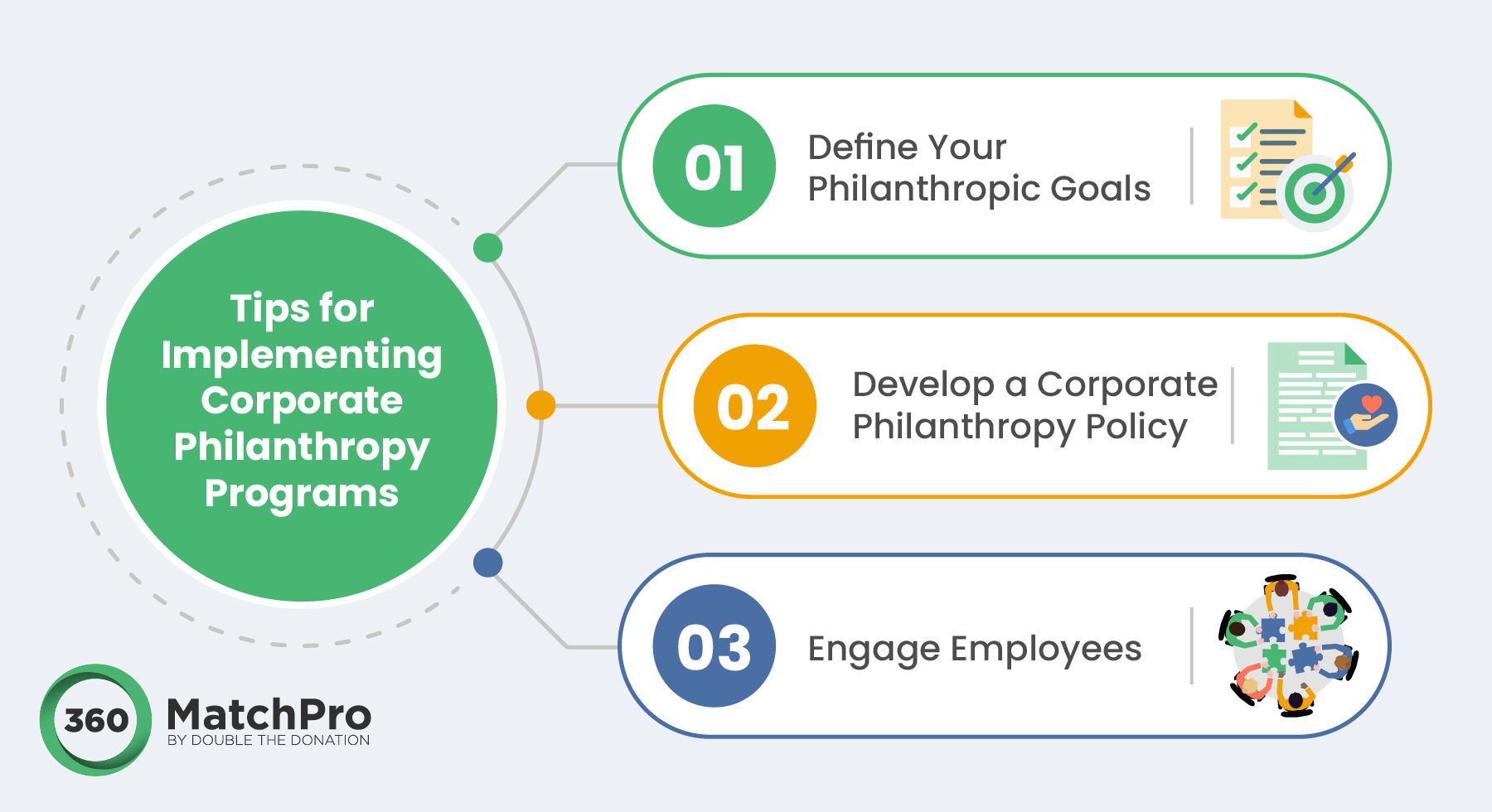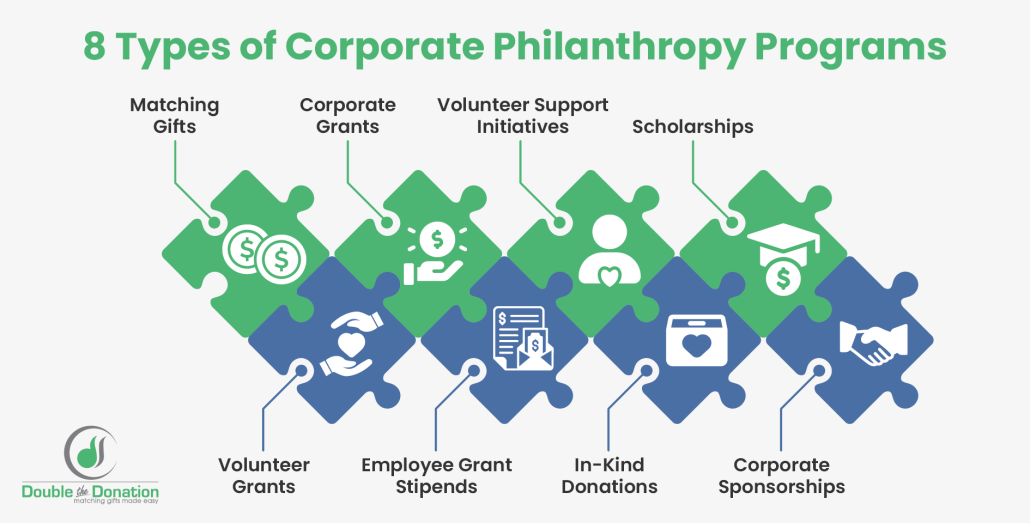Can corporate philanthropy solve urban poverty?
Discovering How Business Philanthropy Shapes Brand Name Reputation and Client Commitment
Company philanthropy greatly influences brand name online reputation and customer loyalty. Business that take part in genuine philanthropic initiatives typically see a positive change in just how customers regard them. This placement of values fosters count on and emotional connections with audiences. Nevertheless, the performance of these kind initiatives can differ greatly. Understanding what really resonates with consumers is important for brands seeking to enhance their social impact and market placement. What approaches will become crucial for future success?
The Advancement of Company Philanthropy
As organizations significantly acknowledge their function in society, the evolution of company philanthropy has actually transformed from mere charitable contributions to a calculated element of brand identification. Business engaged in philanthropy largely for tax obligation benefits or to boost their public picture. In time, this approach changed as stakeholders-- including investors, consumers, and workers-- demanded an extra authentic dedication to social obligation.
Organizations started aligning their kind initiatives with their core worths and business goals, leading to more impactful and thoughtful contributions. This adjustment has motivated firms to buy lasting techniques and community advancement, cultivating a sense of function that reverberates with consumers.
Technological improvements have actually promoted transparency and engagement, enabling services to display their kind initiatives more efficiently. Business philanthropy has emerged as an essential part of company strategy, with organizations embracing the possibility to favorably affect society while enhancing their overall brand name story.
The Influence of Philanthropy on Brand Understanding
While companies take part in kind initiatives to promote social good, these campaigns substantially form brand perception amongst customers. Corporate philanthropy can enhance a brand name's picture by associating it with favorable social effect and area involvement. Consumers often regard brands that proactively get involved in charitable tasks as even more trustworthy and responsible. This assumption can influence buying choices, as consumers might like brands that show a commitment to social concerns.

Structure Emotional Links Via Granting
Company philanthropy acts as a powerful tool for enhancing brand name identification by connecting business values with community demands. Via calculated providing, business can foster area involvement and produce shared worths that reverberate with consumers on an emotional degree. This technique not only reinforces brand name track record but additionally constructs long lasting connections in between companies and their stakeholders.
Enhancing Brand Identification
When firms engage in philanthropic initiatives, they not only add to societal excellent but additionally create much deeper emotional links with their target markets. By straightening their brand with charitable reasons, firms boost their identity and signal worths that reverberate with consumers. This placement produces a story that exceeds services and items, welcoming clients to take part in a shared objective. As customers progressively prioritize purpose-driven brands, firms that actively take part in offering can differentiate themselves in a congested market. Such campaigns foster a sense of commitment amongst customers who really feel directly connected to the brand's values. Inevitably, corporate philanthropy becomes a crucial tool for enhancing brand identification, growing long-term relationships based on shared beliefs and psychological involvement.
Fostering Area Engagement
Numerous research studies suggest that business taking part in community-focused kind campaigns can considerably strengthen emotional connections with their stakeholders. By buying local jobs and supporting social causes, companies cultivate a sense of belonging and count on within the community. This engagement fosters a positive brand photo, as consumers value firms that show authentic issue for societal issues. Additionally, employees frequently feel more determined and honored to be connected with an organization that focuses on area welfare. As an outcome, customers are much more most likely to establish loyalty in the direction of brands that proactively add to meaningful reasons. Eventually, fostering neighborhood engagement via philanthropy not only boosts brand reputation yet also constructs long lasting psychological ties that profit both the community and the firm it serves.
Developing Shared Values
Exactly how can businesses properly create common worths that resonate with their stakeholders? Business can achieve this by straightening their humanitarian initiatives with their core mission and the passions of their communities. By taking part in campaigns that deal with regional demands, companies cultivate emotional connections with customers, boosting brand loyalty. Partnering with non-profits that show shared worths reinforces the brand's image and demonstrates dedication to social duty. Additionally, transparent communication regarding these initiatives enables stakeholders to see the substantial influence of their contributions. Ultimately, by integrating shared values into their business philanthropy, business not just enhance their online reputations yet also cultivate lasting relationships with customers, resulting in enhanced loyalty and count on. This positioning is vital in contemporary consumer decision-making.
Situation Studies: Successful Philanthropic Campaigns
Analyzing successful philanthropic projects exposes different methods that improve brand credibility. Impactful community initiatives, cutting-edge collaboration designs, and long-lasting engagement strategies have actually verified efficient in promoting positive links with consumers. These study highlight the significance of thoughtful company giving up accomplishing both social and company purposes.
Impactful Neighborhood Initiatives
Numerous companies have efficiently leveraged humanitarian projects to improve their brand online reputation while making a significant impact in their areas. For example, a technology company launched an electronic literacy program in underserved areas, offering training and sources that equipped neighborhood citizens. This campaign not only added to community advancement yet also placed the company as a socially responsible leader. Similarly, a significant food business implemented an appetite relief campaign, partnering with local nonprofits to disperse meals to households in demand. This effort enhanced community ties and cultivated client commitment. With these impactful campaigns, companies have demonstrated their commitment to social duty, effectively aligning their brand name worths with the demands of the communities they serve, ultimately improving their general online reputation.
Cutting-edge Partnership Models
The success of impactful neighborhood efforts commonly pivots on cutting-edge collaboration versions that unite varied stakeholders to resolve facility social obstacles. Study highlight just how companies, non-profits, and federal government entities can work together successfully. A multinational corporation partnered with a local charitable to introduce an education program, merging sources and competence to boost area literacy prices. An additional example entailed a technology company and a medical care company joining pressures to establish a telemedicine solution for underserved populaces. These partnerships not just enhanced the reach of philanthropic initiatives but additionally strengthened the brand names' track records by aligning their goals with community demands. Eventually, cutting-edge partnership versions serve as a click here to read stimulant for meaningful adjustment and foster stronger links in between brands and their customers.
Long-term Interaction Strategies

Gauging the ROI of Corporate Social Duty
As companies significantly purchase company social responsibility (CSR) campaigns, understanding the roi (ROI) connected with these initiatives becomes necessary. Gauging ROI in CSR is multifaceted, commonly encompassing both qualitative and measurable metrics. Financial returns can be examined through enhanced sales, boosted best site brand name loyalty, and enhanced staff member morale, which can result in greater performance. Additionally, business might assess cost savings linked to lasting techniques, such as reduced waste or energy usage.
Qualitatively, the effect of CSR on brand name reputation can be assessed with customer assumption researches and social media sentiment analysis. Surveys can offer insights right into exactly how CSR tasks affect consumer commitment and trust fund. Benchmarking against market requirements can assist organizations assess their CSR efficiency - corporate philanthropy. Eventually, a complete strategy to gauging ROI allows business to make educated decisions about future CSR financial investments, straightening approaches with both monetary performance and social impact
Consumer Assumptions and Business Obligation
Increasingly, customers anticipate business to operate with a solid sense of corporate duty, watching honest practices as a requirement for brand name loyalty. This shift in expectation reflects a growing awareness of social and environmental issues, leading customers to favor brand names that straighten with their worths. Customers are a lot more likely to sustain business that participate in transparent practices, demonstrate sustainability, and add favorably to their neighborhoods.
Furthermore, social media amplifies these assumptions, enabling consumers to share their point of views and experiences rapidly. Brand names that stop working to meet these moral requirements risk reaction, while those that embrace company obligation often appreciate improved reputation and client loyalty. As consumers require responsibility, companies need to integrate business social responsibility into their core strategies, prioritizing moral habits not equally as an advertising approach, but as a basic element of their operations. This positioning can eventually result in more powerful find more information brand fondness and continual success in open markets.
Future Patterns in Business Philanthropy and Brand Name Commitment
The landscape of company philanthropy is developing, affected by the elevated customer expectations surrounding company responsibility. Business are significantly integrating social effect into their core organization strategies, not simply as a secondary task. Future trends suggest a change towards openness, with brands sharing comprehensive info concerning their kind initiatives and their direct impacts on neighborhoods.
Innovation is playing an important duty, making it possible for real-time involvement in between customers and brand names. Social media site systems promote straight interaction, permitting customers to articulate their assumptions and hold brands liable. Furthermore, younger generations, especially Millennials and Gen Z, prioritize sustainability and ethical practices, driving businesses to adopt even more diligent techniques.
As business philanthropy ends up being associated with brand identity, firms that authentically straighten their objectives with societal needs are most likely to cultivate stronger customer loyalty. This merging of worths will ultimately shape the future of company online reputation and customer relationships in an increasingly diligent market.
Frequently Asked Questions
Just How Do Customers Discover Out About a Firm's Philanthropic Efforts?
Consumers uncover a business's philanthropic initiatives with various networks, including social media, press launches, community occasions, and word-of-mouth. These opportunities facilitate understanding, allowing individuals to involve with brands that straighten with their values and interests.
What Duty Does Employee Participation Play in Corporate Philanthropy?
Staff member involvement in company philanthropy enhances involvement, fosters a feeling of ownership, and reinforces team communication - corporate philanthropy. This participation commonly enhances the influence of charitable efforts, leading to higher recognition and support for the business's philanthropic efforts
Can Corporate Philanthropy Backfire on a Brand name's Reputation?
If regarded as insincere or opportunistic, business philanthropy can undoubtedly backfire on a brand name's credibility. Unfavorable public assumption may occur, causing diminished count on and loyalty amongst customers that prioritize authenticity in business activities.
Are Smaller Sized Firms as Effective in Philanthropy as Larger Corporations?
Smaller business can be similarly reliable in philanthropy as bigger firms, frequently demonstrating agility and authenticity. Their localized efforts might reverberate a lot more deeply with areas, cultivating real links despite limited resources compared to their larger counterparts.
How Can Companies Choose the Right Causes to Support?
Companies can choose the right reasons by aligning their values with neighborhood demands, evaluating stakeholder rate of interests, and examining prospective effect. This calculated technique promotes authenticity, enhances engagement, and strengthens links with consumers and the more comprehensive neighborhood.
While business engage in philanthropic initiatives to advertise social great, these efforts significantly shape brand name assumption among consumers. As customers significantly prioritize purpose-driven brands, firms that proactively engage in giving can separate themselves in a congested market. Numerous companies have efficiently leveraged humanitarian campaigns to boost their brand name credibility while making a meaningful influence in their neighborhoods. Increasingly, customers expect companies to run with a strong feeling of business responsibility, watching honest techniques as a requirement for brand commitment. As corporate philanthropy comes to be associated with brand name identity, firms that authentically align their goals with societal demands are likely to cultivate stronger consumer loyalty.